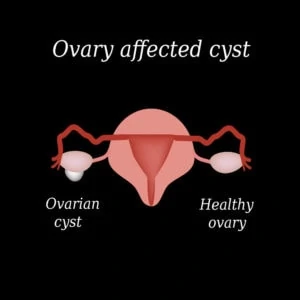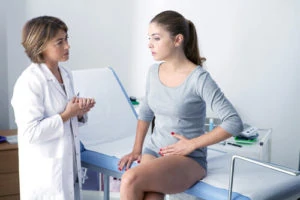Don’t panic.
The word “cyst” can conjure up a slew of frightening mental images, from Elephant Man-level growths to cancer. It’s understandable, then, that you might feel concerned if you heard you had an ovarian cyst.
But according to doctors, ovarian cysts are much more common — and usually less dangerous — than expected. So what do ovarian cysts really mean for your health? Here are eight truths to set the record straight.
1. Chances are high that you’ve had ovarian cysts.
“Most all women form ovarian cysts monthly until menopause,” Bruce Lee, MD, a board-certified OB-GYN and co-founder of Halt Medical, Inc., tells Yahoo Health.
2. Not all cysts are alike.
There are two major types of ovarian cysts, according to Lee: “Functional” cysts, which occur regularly and are normal, and “pathologic” cysts, which are abnormal. Ovarian cysts can also form due to other conditions that affect the ovaries, like endometriosis, but “the overwhelming majority of ovarian cysts are functional,” Lee says.
3. You shouldn’t automatically freak if you find out you have one.
While ovarian cysts sound scary, they’re usually harmless, says Thaïs Aliabadi, MD, a board-certified OB-GYN in Beverly Hills. These fluid-filled sacs form on or within the ovaries and typically go away in one to three months.
4. But they can affect fertility.
Lee says that’s because the Fallopian tubes are connected to the ovaries. If an ovary is abnormal due to a cyst, it can essentially block an egg’s journey and prevent it from being fertilized.

5. You may have an ovarian cyst and not even realize it.
Since most women don’t even know when they have an ovarian cyst, many of them have no symptoms at all. But some women can experience dull or sharp pelvic pain or pressure on the side where the cyst is, says Aliabadi.
6. If you do have an ovarian cyst, you may feel like something’s off when you’re at the gym — or in the sack.
Women will usually feel the pain when they exercise or have sex, says Lee, and the pain can even radiate down through their legs. But they also may notice it more when they ovulate or have their period. Other symptoms include swollen abs, urinating more or less often than usual, and even nausea and vomiting.
7. Chances are your OB-GYN will find your ovarian cyst during your annual visit.
Since ovarian cysts are fairly common, they’re often found during an annual pelvic exam at the gynecologist’s office. Tenderness in one area during the exam is usually a tip-off to a doctor of a cyst or ruptured cyst, says Lee.
The typical next step after a pelvic exam is to get a pelvic or abdominal ultrasound to get a closer look, where the doctor can decipher the type of cyst, and how far along it may be. Of course, women who experience persistent pain in the pelvic area or lower back should see a doctor immediately — and not wait for their annual exam.

8. Even if you have an ovarian cyst, you may not receive any treatment for it.
Ovarian cysts are often not treated since they usually go away on their own, says Aliabadi, but a doctor will want to have a follow-up to make sure the cyst is gone. Women may feel a sharp pain when a cyst bursts, or may not notice it at all.
However, surgery may be needed to remove it if there’s pain after several months, the cyst is large and hasn’t resolved itself, or if there’s a possibility of cancer, she says. And, if recurring cysts are an issue, a doctor will typically prescribe oral contraceptives to prevent them.
While most ovarian cysts are harmless and aren’t treated, Lee says it’s a good idea to get checked out by a doctor if there are symptoms, just in case.
About Dr. Aliabadi
As one of the nation’s leading OB/GYN’s, Dr. Thaïs Aliabadi offers the very best in obstetrics and gynecology, including telehealth appointments. Together with her warm professional team, Dr. Aliabadi supports women through all phases of life. She creates a special one-on-one relationship between patient and doctor.
We invite you to establish care with Dr. Aliabadi. Please click here to make an appointment or call us at (844) 863-6700.
We take our patients’ safety very seriously. Our facility’s Covid-19 patient safety procedures exceed all CDC and World Health Organization recommendations. Masks are required in our office at all times during the coronavirus pandemic.
The practice of Dr. Thais Aliabadi and the Outpatient Hysterectomy Center are conveniently located for patients throughout Southern California and the Los Angeles area. We are near Beverly Hills, West Hollywood, Santa Monica, West Los Angeles, Culver City, Hollywood, Venice, Marina del Rey, Malibu, Manhattan Beach, and Downtown Los Angeles.















